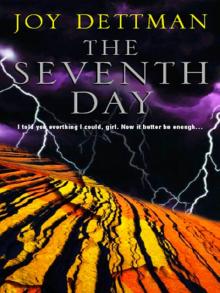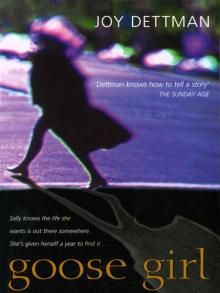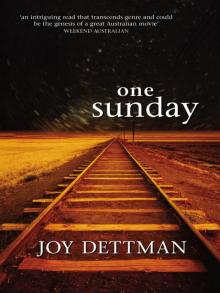- Home
- Joy Dettman
Jacaranda Blue Page 18
Jacaranda Blue Read online
Page 18
‘I love them,’ she said, and she paid for them with her credit card, just for fun.
They walked next door to the chemists. Miss Moreland wanted a new lipstick. She chose two, then chose a matching blusher and a brown eyebrow pencil, a light foundation, but when the assistant handed her the parcel, she removed the brighter lipstick and handed the parcel to Stella.
‘That is not my style, Miss Moreland.’
‘Then it ought to be. Take it, girl. It matches your new shoes.’
‘It cost you a fortune!’
‘Money is only as good as what it will buy. Take it! Your parole officer has spoken.’
Stella smiled. ‘Oh, well – if it will save me from another forty years in solitary.’
In the middle of Main Street, they laughed. It was very un-Stella. People turned to stare at her, so she hid in the electrical goods store. Miss Moreland found a rose pink lightshade there that she thought might add a bit of life to the lamp in the minister’s lounge room. Laughing still, they bought it.
Money was fun. Spending it was euphoric.
They wandered to the whitegoods department, glancing at microwaves, then at the stoves.
‘That’s the same as the one Bonny bought. It has a fan-forced oven, and it cooks so evenly.’
‘That’s what you need, girl. So buy it.’
‘Heavens no. The old one is . . . is still functional.’
‘You sound like your father.’
Stella ran her hand over the smooth white surface, allowing it to rest there. ‘It would probably takes weeks to install it. I’d want to put it in the chimney. Get rid of the old wood stove – ’
‘Ask him.’
‘No. Father would have a fit.’
‘But he’s not here. Be a devil. No harm in asking.’
Then the salesman was at their side and desperate for business. He kept dropping the price until it began to sound like a bargain, too good to miss out on, and somewhere along the line the decision to buy had been taken out of her hands. The only problem now appeared to be the installation.
‘We’ll do it Monday. Rip out the old stove. Stick an exhaust fan in the chimney.’
‘Monday? You mean next Monday?’
‘The one that comes after Sunday, girl. Sold,’ Miss Moreland said, and in a smiling daze Stella followed her friend to the department store.
They looked at jackets, browsed amongst the hats. Miss Moreland bought a cheeky thing, as red as sin. ‘It’ll match my funeral dress,’ she said.
They were laughing as they loaded their last purchases into the car boot, and when they were ready to leave, they didn’t want to leave. This had been a day like none before. If this was freedom, Stella loved it and she wanted more.
‘Are you tired, my dear?’
‘Tired? Me? Why should I be tired?’ Miss Moreland scoffed.
‘Then let’s try the coffee shop’s special. They’ve got savoury pancake filled with avocado and prawns. My shout. Or my bankcard’s. Save us cooking dinner.’
They parted at seven-fifty at Miss Moreland’s front door.
‘I won’t be going to church tomorrow. That crazy old Willy Macy is leading the service. Percy’s psalm-singing I’ll tolerate, but I refuse point-blank to sit through Willy Macy’s twaddle.’
‘Do I have my parole officer’s permission to stay away too?’
‘You set one foot inside that door and I’ll see you go down for life.’
‘If you put it that way.’
‘Have you heard from your father?’
‘Nothing. Still it’s only a week since he left Maidenville. Then the flight out of Sydney was not until Sunday afternoon, so I dare say they wouldn’t have arrived in Africa until the Monday. He would have been exhausted. Lord, I hope he is up to this trip.’
‘He’s tough as old boots. They made us to last in the old days.’
‘I thought he might give me a call, let me know he had arrived, but he’s more likely to send a postcard. Bonny was saying at the meeting on Thursday that it takes over a week to send a card from America. When her mother flew over for John’s wedding, Bonny said she was back before her postcards.’
‘Don’t you go worrying about him. Thanks for lunch and dinner, girl. We’ll have to do it again. I’ll come around and have a look at your stove on Monday.’
‘He said it could take two days.’
‘Then I’ll see it on Tuesday. Enjoy your freedom, girl.’
The Birds
Mr Wilson never went to church, and he’d found himself a tree cutter who didn’t mind working Sunday. At seven-thirty, a chainsaw began its roar outside Stella’s lounge room, and limbs began falling.
She took her breakfast upstairs to her father’s study. Its window looked down on Wilson’s property, and from her seat at her father’s desk she could watch the worker, at home in the trees, his chainsaw, when not in use, dangling from his belt on a long rope.
He is in his natural element, she thought. A young Tarzan. He worked with a safety belt, snibbing it to a limb below, before beginning to cut the limb above. One hand above the cut, he sawed through, or almost through the branch, then pushed it from him to crash to the earth below.
She stared like a child, afraid for the worker, but enthralled by his lack of fear. There was no-one to comment, no-one around to ask if God might deem it a suitable occupation for a woman of her maturity, no-one to care if she sat at the window for one hour or three, staring at the agility of the worker, who looked more primate than man, swinging from limb to limb, from tree to tree.
He saw her there in the late morning and he waved to her, then mouth grimacing, he mimed the cutting off of old Wilson’s head. The old man was standing well back, bellowing instructions that couldn’t compete with the chainsaw.
Stella laughed, reading the worker’s hand signals clearly, and laughing at the final mimed punt kick of an imaginary head. She couldn’t recognise the worker beneath his cap and ear muffs, but he looked like one of Percy White’s boys. Probably the youngest, she decided. Parsimonious Percy had been the town woodman for years. He had handed the business over to his sons.
She placed her two hands to her ears, miming earmuffs. The worker smiled, and held up a thumb. ‘Good.’
She repeated the sign. ‘Good.’
The two, high above the ground and Mr Wilson, shared a private joke, laughing at the self-important little man down below.
‘Silly woman,’ she castigated herself. ‘You’re acting like a child this morning,’ she said. ‘He must think you quite moronic.’ But it was not her opinion, only the opinion of her conditioning, and her inner voice replied. What rubbish. He likes the fact that you are watching him. He is proud of his skill, his ability in the trees. And rightly so, he’s an artist of sorts. By watching him work you are admiring his art no less than you might admire the skilled paintbrush of an artist.
‘Yes,’ Stella agreed, and she sat on. ‘Perhaps I should consider the purchase of earmuffs. They may save me from unwanted advice when I am trying to weed along the fence.’ Mr Wilson was over-generous with his doubtful wisdom; one of the few areas of garden Stella neglected was beside Wilson’s fence.
‘Or perhaps I’ll get one of those radio things with earphones, like Bonny’s boys always seem to have attached to their heads. I’ll buy myself one. Yes. On Monday I’ll march into the electrical shop, pay for my stove and ask to see their range of radios . . . and I might look at their cordless phones while I’m about it. Have one installed in here, in the study. It would save Father’s poor old legs.’
She went off to collect her knitting. It appeared that the White boy intended felling her neighbour’s entire forest. It could be a long and noisy day, if an interesting one. But she should keep her hands busy while she watched the timber fall.
The Wilsons had lived next door since before her birth. They had planted, or allowed nature to plant, a miniature forest in their backyard. The trees were old. Dead branches fell at will, and frequently over
the minister’s fence. Mr Wilson had long been a thorn in the side of her father. A loud little man, he called himself C of E, but he hadn’t been inside a church since his wedding day fifty years ago, and he’d told Martin he didn’t intend seeing the inside of a bloody church again until they carried him in, feet first.
Martin had sworn he wouldn’t bury him.
‘I’ve got ten years on you, you cantankerous old coot. You won’t get the bloody chance.’ Wilson always got the final word.
The war had been raging for most of Stella’s life, and she could understand her father’s attitude towards him and his trees. The forest had annoyed her. Their lounge room saw no sunlight at all, and falling leaves constantly blocked the spouting. Martin was too old and heavy to climb these days, so the ladder work fell to Stella; however, the forest annoyance had recently become danger. A huge branch had come crashing down while Mrs Wilson had been hanging out the washing. Her clothesline, an old but solid contrivance, saved her from certain injury.
But I doubt it was your near miss that did the trick, Mrs Wilson, Stella thought. More likely my hedge fire, and fear of the local firebug. Whatever it was that encouraged her neighbour into parting with his dying forest, it could only be looked on as a plus. He may even get around to mowing his grass.
I’ll have so much more light in the backyard; although it is beginning to look quite bare. Won’t Father be in for a dreadful shock when he returns? No forest beside him, and no hedge before him. While he is not here to hold it back, the outside world is encroaching on his own secret little realm.
‘My goodness,’ she said. ‘Perhaps I should take up my pen again. His Secret World, by Lea S. Temple.’ She could see it, just as she had in her youth. The idea always came with a cluster of words, then imagination began filling in the spaces.
Deranged wife stalking the dark rooms at night with a kitchen knife. Minister screaming into the telephone in the wee small hours of the morning. The child . . . the small child hiding in the dark garden . . .
‘Stop this nonsense,’ she said. ‘This is a childish habit you have long put behind you. Stop this nonsense now.’
It was late afternoon when she saw the birds gathering outside her window. Their trees were gone, their nests, their perches now a pile of timber in Wilson’s backyard.
‘Poor birds,’ she whispered. ‘I had given no thought to my birds.’ Each time she looked outside there appeared to be more gathering. The branches were thick with birds. Strange. Like heavy fruit weighing down the boughs of the apple tree. Feathered fruit.
A shiver travelled down her spine. She thought of a picture show she’d been to with Ron. The birds gathering, attacking.
His secret world.
Again the words played in her mind. The scene was coming, the words spilling, wanting to spill to paper, but this would be no love story, no Mills and Boon.
The house loomed like a dark entity behind the hedge. Birds gathered, their small beaks blood-flecked –
Again she shook her head.
How odd, she thought. There are hundreds of birds. I hadn’t realised that Mr Wilson’s trees would have given home to so many. But of course. Of course they must have. Where else have my birds lived? Oh, you poor dears. Where will you sleep tonight?
So many different varieties. She walked across to her own room and looked at her jacaranda trees. Birds by the score were perched there and more kept coming. As they flew in from their day of play and feeding, they circled and called, then came to jostle for position on the boughs, and to glare at her window with their wide accusing eyes.
‘Some portent of doom . . . the gathering of birds,’ she said. ‘Starlings? Sparrows? Didn’t I read somewhere that they are the harbingers of death?’
Sparrows pecking at the window, trying to get in. The child, hammering at the window, trying to get out. Daddy. Daddy. Daddy.
Silly woman. Your imagination is running away with you. And why not? Why not indeed? Wasn’t it always a better world?
Slowly she returned to the study, her fingers running through her hair. Freedom. She liked the bounce of her neck-length bob. Where Miss Moreland’s scissors had not cut so straight, the curls had sprung up to conceal the mistakes.
‘Samson in reverse,’ she said. ‘My imagination stolen by my hairpins.’ Her hand reached out for paper. She shrugged, inserted it into the old typewriter and she began.
Time went away to that other place.
So carefully she removed the white stockings and the pintucked frock. Now her small hands folded them, then placed them carefully on the chair. She felt cool in her pretty white briefs, her legs delightfully bared to the breeze. But shouldn’t she remove her white briefs too? Mustn’t get them dirty. Dirty was bad.
The oak was a grand climbing tree, and she a small bare monkey, free in her natural element. Green leaves rustled around her like the pages in her favourite book, and the birds, initially afraid, lost their fear of this small intruder. Soon they went about their business of love and courtship. The child sighed too deeply for one of her tender years. How she envied the birds their wings to fly.
Daddy said they flew south for the summer, flew to where it was cool. She liked cool. She flapped her small arms. ‘I’m a birdy. I’m a birdy.’
The voice from below startled her. From her perch high in the branches, she looked down now at the greying hair, and at the mouth screaming its words.
‘Dirty, filthy naked little slut. I’ll show you naked. I’ll show – ’
The town clock and the fading light halted her fingers, but beside the typewriter were seven double-spaced text-filled pages. Where had they come from?
‘Good Lord,’ she said. ‘Good Lord. Where have I been?’
The First of Three
The Templeton house was not a good place to be come Monday morning April Fools’ Day, and Stella was feeling in a young and foolish mood. The workmen had arrived in force at eight-thirty. She left them to it. For an hour she typed, then she dressed for town and walked to the bank, walked into the bank.
It was rather frightening, filling in that first withdrawal form, and she felt like a bank robber as she passed it to the teller, but when the green notes were handed to her, it seemed so little. It was soon gone anyway. She paid cash for the stove, then stayed on at the electrical store listening to the pros and cons of radios and headsets while fearfully eyeing a computer.
Would it be possible for a person of her years to learn the intricacies of those things?
At the same time, Mrs Morris and Mrs Murphy were seated in the doctor’s surgery. They had delivered Young Mick Murphy there. Now they waited to taxi him home. Young Mick was sixty if he was a day, but until Old Mick, his father, died, he would remain, in name, forever young.
This morning, he looked older than his father, and the two friends discussed the possibility that he might not live long enough to ever become plain Mick. They had the two best seats, right next to Sister’s glass window, where armed with camouflage magazines they had settled in to do a little overdue research. From these seats they could glimpse Doctor Parsons when he walked his patients back to the waiting room after the consultation. They watched five patients walk in and walk out, and they made their own diagnoses.
Mrs Morris and Mrs Murphy could glean a lot of information from the expression on both doctor and patient’s face – if they caught a glimpse of them in the hall before features were composed for the outside world. From these seats, they could eavesdrop too on the latecomers who presented themselves at the window, and they always got a close look at any emergency before the injured party was whisked out of sight behind the passage door.
Phone conversations could be, and were, frequently interpreted from Sister’s one-sided monosyllables and verbal shorthand, and if the friends were sometimes a little off dead centre, then they sometimes hit the bull right in the eye.
They agreed that Sergeant Johnson looked like stroke material when he entered the surgery around eleven that Monday. He
was sweating profusely and his face was red. In his rush to get to the office window, he pushed past old Jim Bryant, almost knocking his white walkingstick from his hand.
‘Sorry, Jim,’ he said, steadying the older man. ‘Sorry about that. I have to see the Doc in a hurry. ’Scuse me, everyone. Can you get him out here now?’ he said to Sister.
‘Take a seat. He’s with a patient.’
‘It can’t wait. It’s Miss – ’ He saw the town gossips leaning towards him and he turned his back, dropping his voice to a whisper.
‘Oh, no,’ Sister said.
The old gossips moved closer, their ears straining now as Sister dialled through to the doctor’s room, speaking quietly into the mouthpiece, her hand guarding her words.
‘It’s Johnson. Yes. It’s Miss – you know. Yes. I’d say so, by the look of him. Yes.’
Johnson pushed in front of Mrs Morris and took charge of the telephone. His head through the glass window of the office, he said, ‘G’day, Doc. Yeah. It’s me. Hate disturbing you like this but – yeah. Yeah. As bad as it gets, Doc. Worse. I need you. Need a clear head before I go bringing in the young bloke. He’s city – yeah. Yeah. Yeah. You know. That’s right. You know. Yeah. That’s right. That’s what I’m trying to say. Yeah. Much appreciated.’
Mrs Morris, grasped her neighbour’s hand, their eyes on their respective magazines, widening with disbelief. Near rigid on their chairs they waited for more. But there was no more. They’d have to fill in the gaps, which they would do admirably.
Johnson put the phone down and Doctor Parsons came out, ushering Mrs Cooper before him.
‘But what about me blood pressure, Doctor?’ she said. ‘You didn’t take me blood pressure today.’
‘If I had your blood pressure, Mrs Cooper, I’d be doing two laps around the block each morning, instead of wasting a busy doctor’s time.’ He turned to the watching faces, aware that if they didn’t know what the emergency was by now, then Mrs Morris and Mrs Murphy would soon nose it out.

 The Hope Flower
The Hope Flower Trails in the Dust
Trails in the Dust Diamonds in the Mud and Other Stories
Diamonds in the Mud and Other Stories Moth to the Flame
Moth to the Flame The Tying of Threads
The Tying of Threads Wind in the Wires
Wind in the Wires The Seventh Day
The Seventh Day Thorn on the Rose
Thorn on the Rose Jacaranda Blue
Jacaranda Blue Mallawindy
Mallawindy Ripples on a Pond
Ripples on a Pond Goose Girl
Goose Girl The Silent Inheritance
The Silent Inheritance Henry’s Daughter
Henry’s Daughter Yesterday's Dust
Yesterday's Dust Pearl in a Cage
Pearl in a Cage One Sunday
One Sunday